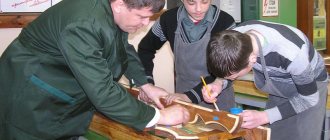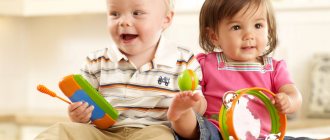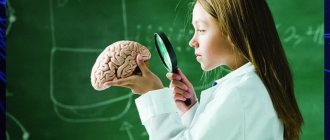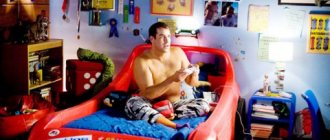Article:
From a very early age, children show an extraordinary desire to understand the world around them.
Like a sponge, they absorb any information, constantly mastering new knowledge and skills during the game, when communicating with others, during classes with parents or teachers. At this time, it is very important to create the most suitable conditions for the child’s intellectual development , to give the baby the right direction for his activities. The most valuable thing in these activities is that the initiative, the desire to learn new things comes directly from the child, and not from adults. This lays the foundation for the subsequent comprehensive development and formation of a harmonious, independent, educated personality.
In order to properly organize the mental education of children, it is necessary to take into account the age characteristics, abilities, interests of a particular child, without allowing overload, to teach the child what he is able to understand and comprehend at this stage, while simultaneously stimulating his desire for new knowledge. Correctly delivered training contributes to the normal, timely mental development of the child.
How to develop a child's brain so that he becomes smart and successful
The intellectual development of a child is a multifaceted process associated with the development of all aspects of the child’s personality. It is the most important component of overall mental development, preparing the child for education and future life.
The success of intellectual development largely depends on systematic intellectual education.
Intellectual education is a purposeful and systematic influence on a child with the aim of developing his mental abilities. Accordingly, the level of intellectual development depends on the actions of educators, teachers, friends and, to a greater extent, parents.
The task of parents of preschoolers and schoolchildren, striving to develop their child’s intelligence as much as possible, is to create the most comfortable psychological and physical conditions and periodically conduct classes.
At what age should a child’s mental education begin?
Mental education is a pedagogical process that is aimed at developing cognitive activity. The goal is to improve the level of development of children. The important condition is not to give as much knowledge as possible. The main thing is to develop ways of cognitive activity.
The human brain is highly active in the first 7 years of life. A child is naturally very curious and absorbs a huge amount of different information. The task of parents is to support the child’s curiosity and stimulate thinking in every possible way. Gaps in mental development are difficult to fill at an older age.
When entering school, children with whom adults were actively involved adapt more quickly to new conditions and mental stress. Children whose mental development was not a priority for adults have difficulty adapting to school and experience extreme stress.
What influences the success of intellectual development?
The degree of development of a child’s mental abilities depends on a number of factors:
- heredity - a set of genes received from parents;
- the course of pregnancy - taking medications, alcohol, smoking, illness, the emotional state of the mother during pregnancy;
- the child’s lifestyle - the opportunity and incentives for his motor and cognitive activity;
- the child's temperament and character;
- social environment - the influence of family, friends, teachers;
- quantity and quality of additional training and development of the mind;
- psychological situation.
Many of the factors described above are predetermined. It is difficult to change them, but every parent can correct them.
Now let's look at some points that affect the level of mental abilities
There is no clear definition of this term; scientists argue on what the level depends. But there are three criteria that determine it:
- Cognition. This is the ability to understand and analyze the speech of another individual or to comprehend a book read, for example;
- Sanity. Characterized by the ability to soberly assess a situation, highlight positive and negative aspects, and maintain objectivity in extreme circumstances;
- Memory. Ability to remember necessary and important information. The ability to reproduce it at the required point in time.
We figured out what affects the level of mental abilities, and now we’ll find out how to measure them.
When should you start developing your baby's mind?
Since the course of pregnancy is one of the factors influencing the development of the child’s mental abilities, the expectant mother can take care of her child even before he is born. Simple steps will help you lay the foundations for future intelligence:
- listening to calm classical music;
- communication with the baby;
- moderate physical activity;
- balanced diet;
- spiritual enrichment of the mother.
During infancy and early childhood, parents need to create a harmonious psychological environment in the home and regularly communicate and play with the baby.
It is worth remembering that thinking is closely related to movement . Do not limit the baby’s mobility: let the baby toss and turn and crawl, the grown-up baby walks, interacts with various objects, and then jumps, runs, and does physical exercise.
Special classes should be started with a child from 2 to 8 years old. At this age, the mental and emotional spheres are in their infancy, which means that all the efforts you expend will benefit the child’s intellect. Engage with your child: play logic games, read books to him, broaden his horizons and expand his vocabulary.
Moderate
With a moderate (average) form of mental retardation in children, the IQ level varies from 35 to 49 points. Children with moderate mental retardation differ in appearance from healthy children: their faces are practically devoid of facial expressions, their eyes blink very rarely. Children with moderate mental retardation often have protruding ears and attached lobes, a defective bite, rough facial features, micro- or hydrocephalus, and widely spaced eyes. The gait of such children is slow and stiff, and fine motor skills are very poorly developed. Possible speech defects: stuttering, lisp. Children with a moderate form of mental retardation have serious problems with the perception and expression of information and their own emotions (they experience fear, joy, affection, and can distinguish praise from blame). Memory is very limited and selective. It is possible to teach self-care skills to children with moderate mental retardation, but serious problems arise with schooling. Even reading and basic arithmetic can become an impossible task. The total vocabulary does not exceed 200 - 300 words. Of course, there is no longer any question of receiving any kind of education, but in the future, people with a moderate form of mental retardation can perform some simple work that does not require decision-making. They can live at home, in a family, under the supervision of loved ones. As they grow older, they are assigned to special schools or social institutions, where they can live and do some simple work. If problems with neurology and psyche develop, hospitalization in a psychiatric clinic may be required. – A child suffering from a moderate form of mental retardation needs to be dealt with comprehensively. A neurologist and psychiatrist will prescribe drug therapy that improves brain processes, psychostimulants, and anticonvulsants. Classes with a speech therapist-defectologist are also necessary; training is possible only at home, the oligophrenopedagogist clarifies.
Stages of thinking formation
The first stage of development of intellectual abilities occurs in the 2-3rd year of a baby’s life. At this time, it is worth paying attention to the baby’s vocabulary. To enrich it, parents need to talk to their baby as often as possible and read expressively.
It is also worth working on the basics of logic; for this, the child is offered various exercises:
- Familiarity with objects of different sizes, shapes, textures and materials. By feeling, biting, throwing and breaking them, the child gradually realizes that different objects have different properties.
- Getting to know smells , tastes and sounds. At the same time, the baby develops the ability to distinguish tastes, smells, sounds and assign certain characteristics to a number of objects. “An apple has its own shape, its own taste, its own smell, but a rose looks, smells and feels completely different.”
- Formation of the foundations of the psyche . Improving intellectual abilities occurs through influence on the sphere of the psyche; in this case, fairy tales are a proven assistant.
The second stage begins at 3-4 years. At this age, the child’s “I” awakens: he realizes himself as a full-fledged person who has his own thoughts and plans. There is no need to hinder the independence of three-year-old children; let them be active and explore the world in a manner that is comfortable for them.
To influence a child’s mental abilities, parents should:
- encourage the child's initiative . Let him do your usual actions worse and longer, but he does it himself and of his own free will - this is important.
- give feasible instructions . At this time, you can accustom the child to duties and responsibility for their implementation.
- your child's small victories seriously and attentively . Understanding on the part of parents will help form an adequate level of self-esteem for the child.
- the child's creativity and creative thinking . Let the baby draw, sculpt, play musical instruments - do what he likes.
The third stage takes place at 4-7 years. The cognitive development of preschool children should take place in a playful way, in which they most effectively absorb information. Board, computer and outdoor, single and group games allow you to develop logic and increase your erudition in an unobtrusive environment.
At this age, it is necessary to increase the emphasis on communication with friends, relatives, and acquaintances - this will help develop the child’s social skills. Remember: the development of the intellectual and social abilities of preschool children is the basis for learning at school.
Sensorimotor stage (birth to 2 years)
The first stage is called sensorimotor because at this stage children have a special connection between motor (motor) activity and thinking (sensory perception). At this stage, babies master various motor skills - grabbing, holding on to objects, throwing, crushing, hitting, etc. In the process of such actions, they comprehend how objects behave and what will happen if they are treated this way.
The child begins to realize himself as a bearer of action, as well as the fact that he is a separate subject. He notices the result of his actions and learns to act voluntarily, with the intention of obtaining a certain effect. For example, an infant shakes a rattle to make a sound.
The most important discovery at this stage is the concept of object permanence - the child learns that an object continues to exist, even if it becomes inaccessible to the senses, i.e. invisible or out of sight. Thus, children aged 5 to 8 months discover that even if a toy is hidden, for example, under a blanket or behind something, then, although it is not visible, it is there and can be taken. However, a child about a year old will still look for the toy where he last found it, and not where he saw it hidden.
To better understand what this looks like, watch this short video in English showing children's varying abilities to understand the principle of object permanence.
Another significant phenomenon observed around the same time in children at the sensorimotor stage of development is fear of strangers. It is caused by the fact that the child is not able to assimilate strangers and strangers into his existing schemes.
The first stage of development, spanning ages from birth to about 2 years, is followed by the preoperational stage.
Ways to develop intellectual potential
The development of intelligence in preschoolers can be achieved using various methods. The most common methods are games : checkers, chess, board games, etc. They are aimed directly at mental stress, which means they allow you to get visible results quite quickly. The only negative is the rapid fatigue of the child, which they lead to.
To change activities without stopping the development of intelligence, offer your child creative activities . The process of drawing, sculpting, designing and decorating develops creativity, attention and perseverance.
Reading can also be a great alternative . By reading, the child learns to build abstract images, without relying on any sense organs. In addition, regular reading allows you to develop erudition and expand your vocabulary.
You can train your brain by answering quiz questions, solving riddles, and solving puzzles. Make crosswords, puzzles, mazes, charades your common hobby.
Lightweight
With a mild form of mental retardation in children, the IQ level ranges from 50 to 69 points. Children with mild mental retardation are practically no different in appearance from their healthy peers. Problems, as a rule, begin at school age: children find it difficult to perceive and remember information from the teacher, they find it difficult to concentrate on completing a task, and they are constantly distracted. Even memorizing a four-line poem can be very difficult for a student. – Children with mild mental retardation often develop some strange behavior. They can be closed, unsociable, difficult to make contact and panicky afraid of everything new, in particular new acquaintances. But it happens that such a child, on the contrary, is hyperactive, he fools around too much, does some strange things, thus trying to express himself and attract attention. In any case, a problem of social adaptation may arise, says the oligophrenopedagogist. A child with mild mental retardation is able to experience the whole gamut of emotions, but complex, mixed emotions are more difficult for him to express. Also, such children can be too naive and suggestible, so they can fall under bad influence. As a rule, children with mild mental retardation can study in a correctional school using a special lightweight program. With regular sessions with a speech pathologist and psychotherapists, they achieve good results in their learning. In the future, they can receive a secondary specialized education and find a decent working profession, have a family and children.
Games for developing intelligence
The leading activity of preschoolers and primary schoolchildren is play. Accordingly, classes in a game format will be perceived much easier and more positive. We offer you games that will allow you to develop all areas of your intellect.
Who's missing?
A simple game in which the child first needs to remember several objects (you should start with 3-4), and then indicate the eliminated object.
For example : place 4 toys in front of the baby: a bear, a cat, a dog and a hare. Ask your child to name all the objects and then turn away. When the child is not looking, remove one toy and ask him to name what is missing.
With the help of such a simple game you can not only develop attentiveness and memory, but also learn colors, shapes, names of objects, animals and plants. Gradually the game should be complicated: use more and more items; do not remove things, but change their places; conduct the game without warning, etc.
My big bag
A game in which the child needs to evaluate the purpose of the trip and select the most important items for its implementation. Allows you to develop logical thinking, observation and independence.
For example : put a large bag in front of the child and tell him that his favorite toy wants to visit grandma/go to the store/school/play with friends, etc. The child needs to help the toy collect the bag and put only 5 things in it (the number of items in the bag should be limited). When packing luggage, the child must explain his choice, keep count of the packed items and carefully pack the bag.
Treasure search
This game will be a real adventure that will help you gain spatial orientation and attention skills.
For example : hide an interesting object in a place accessible to the child and invite him to find the “treasure”. To do this, he must execute your commands, structured like: “Take two steps forward!”, “Turn to the right!”, “Look under the table!” etc.
You can complicate this game endlessly: add riddles along the baby’s path; offer to follow not your commands, but navigate using the map; offer to draw a map yourself under your dictation, etc.
The letter is away
An excellent opportunity to keep your child busy for a long time and get acquainted with the alphabet and develop reading skills.
For example : dedicate each day to a specific letter of the alphabet. Read fairy tales about her, find her in the text, speak only in words starting with this letter, etc. The greatest effect can be achieved if all family members are involved in the game.
Find the odd one out
Offer your child different sets of objects so that he can choose one extra one from among them. The main thing is to justify your point of view, since quite often there may be several correct answers. The game will allow you to develop logic, knowledge about the world around you and vocabulary.
Gradually, you can invite the child to find common characteristics in dissimilar objects, gradually offering more and more unusual combinations.
Pre-operational stage (from 2 to 6 years)
The second stage generally corresponds to preschool age (it must be taken into account that the age indicated in this theory is approximate). It was called pre-operative, because. At this stage, children do not understand operations - logical manipulations, and do not know how to think logically. Operations refer to procedures such as division, union and other transformations that require logical thinking. In other words, a child at this stage, especially at its beginning, is not able to use logical categories and operations: classify, compare, evaluate, measure, etc.
However, at this stage, a very important feature is observed - children master speech and begin to actively use symbolic thinking. Those. they use words and symbols to represent objects, groups of objects, images and ideas, and actively use imagination and symbolic play. Thus, cubes can become kingdom subjects or buildings, and a child’s hands can become airplane wings. Such play and the ability to “pretend” is actually an important cognitive achievement—a degree of abstraction not available to great apes and other animals.
Jean Piaget believed that children at this stage are unable to maintain attention on more than one aspect of a situation or characteristic, and in addition, children's logic is based on personal experience rather than generally accepted rules and laws. Thus, at the age of 3-4 years, children are not able to understand the concept of conservation of matter. The principle of conservation is the understanding that the amount of a substance will remain the same even if its shape changes. For example, if you pour water from a short and wide glass into a tall and narrow one, there will be the same amount of water in it. And if you roll out a ball of plasticine into an oblong sausage, the amount of plasticine will not change. Such operations become available to children only at the next stage of cognitive development.
To see what the logic of children at an early stage of the pre-operational stage of development (who have not yet mastered the principle of conservation of mass and quantity) looks like in life, watch this video. (https://www.youtube.com/watch?v=ZDNi4z5tdqU)
Another distinctive feature of this stage is children's egocentrism. In this context, this means that a child up to the age of approximately 3 years perceives the world as an extension of himself, exactly as he sees it, without realizing and often with difficulty accepting points of view that differ from his own. At this stage, it is natural for children to believe that everyone sees and perceives the world exactly the same as they do, and has the same feelings, thoughts, preferences and desires.
Between about 3 and 5 years of age, children begin to realize that other people have their own points of view, feelings and thoughts, and they perceive the world differently, in their own way. This phenomenon is called the model of the human psyche (or theory of mind, in English).
The pre-operational stage is replaced by the stage of concrete operations, at which children demonstrate a greater ability for logical thinking. We will consider this, as well as the fourth stage - formal operations, in detail next time, as well as valuable practical considerations and recommendations for parents.
In the meantime, we invite you to our program “Cognitive Science. Development of thinking." This online training will be useful to all those who want to learn to reason logically and consistently, quickly make effective decisions and find innovative approaches to difficult problems.
Good luck!
We also recommend reading:
- Storytelling
- Theories of thinking
- Genetic psychology
- Factors in a child’s intellectual development
- Piaget's theory of cognitive development
- A selection of courses for children and parents
- Conceptual thinking: by stages of cognition
- How to teach a child to read: rules, tips and tricks
- Cognitive sphere of personality
- Speech thinking in children and adults: what is it and why is it needed?
- Cognitive development. Part 2
Key words:1Cognitive science
How can we help?
To develop a child’s intellectual abilities you need to work with him , come up with the most unexpected and interesting activities every day, and get involved in the game. Unfortunately, many parents cannot pay enough attention to their baby. If you are in the same situation and want to give the most to your child, you can contact the “Generation” children's studio. Here, experienced teachers, psychologists and speech therapists will work with your baby - we will make sure that the child’s abilities are maximally developed .
Conclusion
Early development methods are offered by a large number of child care institutions and it is difficult for parents to choose among all this diversity. Some organizations teach children using a specific method. Other organizations combine different areas.
Children's children recommend giving preference to the option of combining different areas of children's development. In our classes, we pay attention to 10 skills at once, described by scientists and psychologist Tony Buzan, the author of the method of memorization and organization of thinking. Sign up for our children's clubs and kindergartens. We will contribute to the comprehensive development of your child.
Heavy
A severe form of mental retardation in children is characterized by serious organic damage to the brain and an intelligence not exceeding 34 points. With this form of mental retardation, speech and thinking are almost completely absent - patients communicate only with the help of mooing and inarticulate sounds. Most often, children with idiocy cannot walk independently and have multiple internal defects. Children with severe mental retardation are practically unable to experience conscious emotions, but during uncontrollable outbursts of anger they can be aggressive and dangerous to others. They often harm themselves - they scratch their faces, pull out their hair, and in a calm state they are lethargic and inactive. As a rule, idiocy is detected at an early age - the child begins to hold his head up, roll over and sit very late. A child with idiocy has a characteristic facial expression with a grimace of anger or, on the contrary, aloof. The tongue may be very large and protrude from the mouth. A child with a severe degree of mental retardation is completely unteachable, is not capable of even basic self-care skills, does not control the processes of urination and defecation, does not distinguish edible from inedible, cold from hot, is not able to feel satiety, and openly engages in masturbation. Unfortunately, children with idiocy cannot live and be raised in an ordinary family, and they are sent to specialized boarding schools, where, with proper care and medication correction, they are quite capable of living up to 40 years.
Syndromes combined with different degrees of MR
Down syndrome is the most common genetic cause of intellectual disability. It is caused by a chromosomal abnormality - if normally there are 46 of them, then in this case there is an unpaired 47th chromosome. People with this syndrome can be identified by an abnormally short skull, flat face, short arms and legs, short stature, and small mouth. They process the information received poorly and remember it, they lack the concept of time and space, and their speech is poor. Moreover, such individuals adapt well to society.
Martin-Bell syndrome (fragile X chromosome). The second most common genetic cause of mental retardation. It is recognized by the following external features: increased mobility of joints, an elongated face, an enlarged chin, a high forehead, large, protruding ears. They start talking late, but poorly, or don’t speak at all. Very shy, hyperactive, inattentive, constantly moving their arms and biting them. Men have more cognitive impairment in this category than women.
Williams syndrome (“elf face”). It occurs as a result of hereditary chromosomal rearrangement, the loss of genes in one of them. The patients have a very interesting appearance: the face is narrow and long, blue eyes, flat nose, large lips. Usually suffer from cardiovascular diseases. Rich vocabulary, good memory, excellent musical abilities, and social interaction skills. But there are problems with psychomotor skills.
Angelman syndrome (happy doll or Parsley). Caused by a change in chromosome 15. Very light eyes with characteristic spots on the iris and hair, the head is small, the chin is pushed forward, the mouth is large, the teeth are sparse and long. Severe delay in psychomotor development, significant impairment of speech and movement (poor balance, walks on stiff legs). He often smiles and even laughs for no reason.
Prader-Willi syndrome . It is characterized by the absence of a paternal copy of chromosome 15 and a number of other disorders. He is short in stature, has small arms and legs, suffers from compulsive overeating, and, as a result, obesity. Problems with short-term memory, speech, information processing.
Lejeune's syndrome (cry of the cat or 5p syndrome). A very rare and serious disease caused by the absence of the short arm of chromosome 5. The head is small, the face is round, the lower jaw is underdeveloped and the bridge of the nose is wide, so the eyes are located far from each other. The feet are turned out, the hands are small. The larynx is underdeveloped, there are vision problems, in particular, strabismus. She often cries and makes a sound similar to a kitten meowing. Motor development is delayed, and the ability to pay attention is limited.
In addition to the syndromes mentioned, intellectual disability can coexist with cerebral palsy, deafness and blindness, autistic disorders, epilepsy and other somatic and mental illnesses.
Treatment methods
After diagnosing the condition, depending on the indications, the specialist can prescribe drug therapy, but the most important thing is that he connects the child to a system of psychological and pedagogical assistance, which includes correctional classes, in most cases, with three specialists. This is a defectologist, speech therapist and psychologist. Very often one teacher has two specializations, for example, a speech therapist-defectologist. Help from these specialists can be obtained at correctional centers or within a preschool educational institution. In the latter case, the child, accompanied by his parents, must undergo a psychological, medical and pedagogical commission. Early identification and timely connection of a child to psychological and pedagogical correction directly affect the further prognosis and level of compensation for identified developmental disorders. The sooner it is identified and connected, the better the result!









